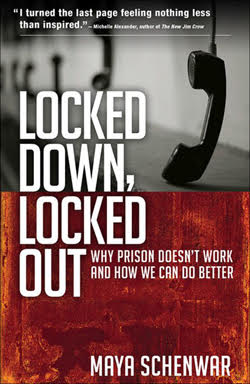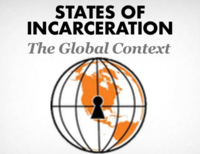Breaking Down A Prison Nation: A review of Locked Down, Locked Out
Schenwar's book Locked Down, Locked Out is as much about her personal experience with the prison system as it is about her extensive knowledge.
by Elydah Joyce, August 25, 2015
 At the center of Maya Schenwar’s book are the personal truths written to her from the confines of the prison nation. It is from these selected words, transcribed from correspondences with Lacino Hamilton, an incarcerated man from Detroit, that Schenwar’s core message shines through, “Human lives are what weighs in the balance…what are we waiting for?”.
At the center of Maya Schenwar’s book are the personal truths written to her from the confines of the prison nation. It is from these selected words, transcribed from correspondences with Lacino Hamilton, an incarcerated man from Detroit, that Schenwar’s core message shines through, “Human lives are what weighs in the balance…what are we waiting for?”.
Locked Down, Locked Out is a piercing breakdown of the “prison nation” we live in today and the complexities of working towards a future free of these walls. The scope and depth of Locked Down, Locked Out make this short 200-page read a great introduction for a beginner or a great addition to one’s growing collection of prison justice literature. Divided in half, the first part of this book lays out the details of a nation that has come “apart”, taking distorted notions of safety and protection to obscure the realities of a system that is failing people at every turn. The second half is hopeful, exploring what it means for communities to come “together” and struggle for a brighter future.
Early on, it becomes clear that this book is as much about Schenwar’s personal experience with the prison system as it is about her extensive knowledge. She did not write this book just as a theorist or activist, but also as a directly affected member, recognizing the reality of prison: “prison doesn’t stop at the bared wire fence, and it doesn’t end on a release date.” Further, Schenwar doesn’t shy away from the deep racism of the prison nation, constantly highlighting that she and her family’s experience of the prison industrial complex comes from a privileged position of being both white and middle class in a nation where the justice system is, bluntly put, “a modern version of the slave auction book.”
The hardships of Schenwar’s personal relationship with the prison system take a brighter turn in “Coming Together”, the second portion of the book. Here, Schenwar dives into the complexity of dismantling the prison nation, as she explores the relationships between families, prison activists, those incarcerated, and the hundreds of thousands caught in the wider net of correctional control. For example, when speaking about abolition-based action, she describes how successful efforts to close multiple state facilities led to ultimate overcrowding and even higher limitations on medical access for the incarcerated, placing the burden of “progressive” change on those locked inside. Schenwar’s support for prison abolition is undeniable, but she is always mindful of its complexities because “when it comes to decarceration, a victory is never the end.”
Nevertheless, victories are still necessary, and Maya Schenwar spends the final half of Locked Down, Locked Out detailing how to tear down the walls created by the grim isolation, failure and cruelty of the USA’s carceral state. The prison nation is not the finale to this country’s dark history. From halting the school-to-prison pipeline with Peace Rooms to removing the state’s ability to ‘punish’ crime through community-led transformative justice circles, Schenwar leaves the reader with hope that the prison nation is a destructible wall gradually but surely being broken down.



